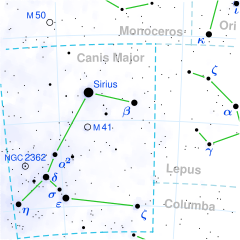弧矢七
弧矢七(英語:Epsilon Canis Majoris,拉丁文形式為ε Canis Majoris,縮寫為Epsilon CMa、ε CMa)是一對聯星。它是大犬座的第二亮星,視星等+1.50,也是亮星表中的一顆亮星。大約在470萬年前,它的視星等高達-3.99,是當時天空中最亮的恆星[9]。依據依巴谷衛星測量的視差推算,它與太陽的距離大約是430光年[4]。
| 觀測資料 曆元 J2000 | |
|---|---|
| 星座 | 大犬座 |
| 星官 | 弧矢 (井宿) |
| 赤經 | 06h 58m 37.6s |
| 赤緯 | –28° 58′ 19″ |
| 視星等(V) | 1.50[1] |
| 特性 | |
| 光譜分類 | B2II[2] |
| U−B 色指數 | –0.93[1] |
| B−V 色指數 | –0.21[1] |
| 天體測定 | |
| 徑向速度 (Rv) | +27.3 km/s |
| 自行 (μ) | 赤經:+2.63[3][4] mas/yr 赤緯:+2.29[3][4] mas/yr |
| 視差 (π) | 7.57 ± 0.57[3][4] mas |
| 距離 | 430 ± 30 ly (132 ± 10 pc) |
| 絕對星等 (MV) | –4.8[5] |
| 詳細資料 | |
| 質量 | 12.6 ± 1.0[2] M☉ |
| 半徑 | 13.9[6] R☉ |
| 表面重力 (log g) | 3.39[7] |
| 亮度 | 38,700[7] L☉ |
| 溫度 | 22,900[7] K |
| 自轉速度 (v sin i) | 25[8] km/s |
| 年齡 | 22.5 ± 2.6[2] Myr |
| 其他命名 | |
| 參考資料庫 | |
| SIMBAD | 資料 |
名稱
編輯拜耳賦予的名稱是ε CMa ,但國際天文學聯合會(IAU)採用的名稱是ε CMa A和ε CMa B[10],是源自華盛頓多星目錄在多星系統(WMC)中約定成俗的用法。
弧矢七傳統的英文名稱是Adhara(有時被拚寫成Adara、Adard、Udara或Udra),源自阿拉伯文的عذارى 『aðāra』,意思是「處女」[11]。在2016年,國際天文學聯合會組織下的IAU恆星名稱工作組(WGSN) [12]對恆星的正確名稱進行編目和標準化,決定將傳統的名稱只賦予單獨的恆星,而不是整個恆星系統 [13]。它在2016年8月21日核定Adhara是弧矢七A的名稱,並且已列入IAU批准的恆星名稱表內[14]。
在17世紀的埃及天文學家Al Achsasi al Mouakket編輯的《Calendarium》中,它被稱為Aoul al Adzari(أول العذاري awwal al-adhara),翻譯成拉丁文是Prima Virginum,意思是「處女之首」[15]。同為處女之星的還有弧矢二(大犬座η星)、弧矢一(大犬座δ星)和軍市增五(大犬座ο2)[11][16]。
在中國天文學中,弧矢意思是弓和箭[17]。它與弧矢二(大犬座δ星)、弧矢一(大犬座η星)、船尾座C星、ZI674、船尾座ο星、船尾座κ星、大犬座k星和船尾座π星組成一個星官 弧矢,是瞄準天狼星的弓與箭。弧矢七的意思是這個星官的第七顆星[18]。
同名
編輯美國海軍的USS Adhara (AK-71)是以這顆恆星的英文名字命名的巨爵級貨輪。
物理性質
編輯弧矢七是聯星[3][19]。主星弧矢七A的視星等是+1.5等,光譜類型為B2。由於表面的溫度是22,200K,因此,它的顏色是藍色或藍白色。它發出的總輻射相當於太陽的38,700倍。這顆恆星也是夜空中最著名的超紫外線源[20]。它是使太陽附近星際氣體的氫原子產生電離的最強光子源,對於本地星際雲的電離狀態非常重要[21]。
伴星弧矢七B的視星等為 +7.5等(絕對星等 +1.9),距離主星7.5" ,相對於主星的位置角為161° 。儘管相對的角距離大,但因為主星比伴星亮約250倍,還是需要大望遠鏡才能分辨出來。
在數百萬年前,弧矢七與太陽的距離比現在近很多,導致它是當時夜空中最明亮的恆星。大約在470萬年前,它距離太陽只有34光年,視星等為 -3.99等,是天空中最亮的恆星。因為至少在500萬年內不會有其它恆星能如此明亮,弧矢七是歷史上最明亮的恆星[9]。
文化
編輯相關條目
編輯參考資料
編輯- ^ 1.0 1.1 1.2 Ducati, J. R. VizieR Online Data Catalog: Catalogue of Stellar Photometry in Johnson's 11-color system. CDS/ADC Collection of Electronic Catalogues. 2002, 2237: 0. Bibcode:2002yCat.2237....0D.
- ^ 2.0 2.1 2.2 Tetzlaff, N.; Neuhäuser, R.; Hohle, M. M., A catalogue of young runaway Hipparcos stars within 3 kpc from the Sun, Monthly Notices of the Royal Astronomical Society, January 2011, 410 (1): 190–200, Bibcode:2011MNRAS.410..190T, arXiv:1007.4883 , doi:10.1111/j.1365-2966.2010.17434.x
- ^ 3.0 3.1 3.2 3.3 Perryman, M. A. C.; Lindegren, L.; Kovalevsky, J.; Hoeg, E.; Bastian, U.; Bernacca, P. L.; Crézé, M.; Donati, F.; Grenon, M.; Grewing, M.; Van Leeuwen, F.; Van Der Marel, H.; Mignard, F.; Murray, C. A.; Le Poole, R. S.; Schrijver, H.; Turon, C.; Arenou, F.; Froeschlé, M.; Petersen, C. S.; et al. The HIPPARCOS Catalogue. Astronomy and Astrophysics. 1997, 323: L49–L52. Bibcode:1997A&A...323L..49P.
- ^ 4.0 4.1 4.2 4.3 van Leeuwen, F., Validation of the new Hipparcos reduction, Astronomy and Astrophysics, November 2007, 474 (2): 653–664, Bibcode:2007A&A...474..653V, arXiv:0708.1752 , doi:10.1051/0004-6361:20078357
- ^ Snow, Theodore P.; Lamers, Henny J. G. L. M.; Lindholm, Douglas M.; Odell, Andrew P. An atlas of ultraviolet P Cygni profiles. The Astrophysical Journal Supplement Series. 1994, 95: 163. Bibcode:1994ApJS...95..163S. doi:10.1086/192099.
- ^ Underhill, A. B.; et al, Effective temperatures, angular diameters, distances and linear radii for 160 O and B stars, Monthly Notices of the Royal Astronomical Society, November 1979, 189 (3): 601–605, Bibcode:1979MNRAS.189..601U, doi:10.1093/mnras/189.3.601
- ^ 7.0 7.1 7.2 Lyubimkov, L. S.; Rostopchin, S. I.; Lambert, D. L., Surface abundances of light elements for a large sample of early B-type stars - III. An analysis of helium lines in spectra of 102 stars, Monthly Notices of the Royal Astronomical Society, June 2004, 351 (2): 745–767, Bibcode:2004MNRAS.351..745L, doi:10.1111/j.1365-2966.2004.07825.x
- ^ Abt, Helmut A.; Levato, Hugo; Grosso, Monica, Rotational Velocities of B Stars, The Astrophysical Journal, July 2002, 573 (1): 359–365, Bibcode:2002ApJ...573..359A, doi:10.1086/340590.
- ^ 9.0 9.1 Tomkin, Jocelyn. Once and Future Celestial Kings (PDF). Sky and Telescope. April 1998, 95 (4): 59–63. Bibcode:1998S&T....95d..59T.[永久失效連結]
- ^ Hessman, F. V.; Dhillon, V. S.; Winget, D. E.; Schreiber, M. R.; Horne, K.; Marsh, T. R.; Guenther, E.; Schwope, A.; Heber, U. On the naming convention used for multiple star systems and extrasolar planets. 2010. arXiv:1012.0707 [astro-ph.SR].
- ^ 11.0 11.1 Allen, R. H. Star Names: Their Lore and Meaning Reprint. New York: Dover Publications. 1963: 130 [2018-07-05]. ISBN 0-486-21079-0. (原始內容存檔於2024-04-05).
- ^ IAU Working Group on Star Names (WGSN), International Astronomical Union, [2016-05-22], (原始內容存檔於2020-05-13).
- ^ WG Triennial Report (2015-2018) - Star Names (PDF): 5. [2018-07-14]. (原始內容存檔 (PDF)於2019-08-23).
- ^ Naming Stars (including "List of IAU-approved Star Names as of January 1st, 2021"). IAU.org. [2021-02-28]. (原始內容存檔於2020-04-11).
- ^ Knobel, E. B. Al Achsasi Al Mouakket, on a catalogue of stars in the Calendarium of Mohammad Al Achsasi Al Mouakket. Monthly Notices of the Royal Astronomical Society. June 1895, 55 (8): 429–438. Bibcode:1895MNRAS..55..429K. doi:10.1093/mnras/55.8.429.
- ^ 大犬座ε星是Aoul al Adzari 或Prima Virginum (第一處女) 、大犬座ο2星是Thanih al Adzari或Secunda Virginum (第二處女) 、大犬座δ星是Thalath al Adzari或Tertia Virginum (第三處女). 大犬座η星應該是Rabah al Adzari或Quarta Virginum (第四處女)
- ^ 弧矢 (Hú Shǐ) is westernized into Koo She. R.H. Allen opined that Koo She refers to the asterism including Delta Velorum and Omega Velorum. AEEA opinion is, Delta Velorum is member of 天社 (Tiān Shè), meaning Celestial Earth God's Temple asterism and Omega Velorum is not a member of any asterisms. 天社 (Tiān Shè) is westernized into Tseen She and R. H. Allen used the term Tseen She for Chinese name of η Carinae. See Richard Hinckley Allen: Star Names — Their Lore and Meaning: Argo Navis and (中文) AEEA (Activities of Exhibition and Education in Astronomy) 天文教育資訊網 2006 年 7 月 17 日 (頁面存檔備份,存於網際網路檔案館).
- ^ (中文) AEEA (Activities of Exhibition and Education in Astronomy) 天文教育資訊網 2006 年 7 月 17 日 (頁面存檔備份,存於網際網路檔案館)
- ^ Perryman, Michael, The Making of History's Greatest Star Map, The Making of History's Greatest Star Map:, Astronomers』 Universe (Heidelberg: Springer-Verlag), 2010, Bibcode:2010mhgs.book.....P, ISBN 978-3-642-11601-8, doi:10.1007/978-3-642-11602-5
- ^ Wilkinson, E.; Green, J. C.; McLean, R.; Welsh, B. Extreme Ultraviolet Spectrum of ɛ Canis Majoris Between 600-920 Å. Bull. Am. Astron. Soc. 1996, 28 (2): 915. Bibcode:1996BAAS...28..915W.
- ^ Vallerga, J. V.; Welsh, B. Y. Epsilon Canis Majoris and the ionization of the local cloud. Astrophys. J. 1995, 444: 702–707. Bibcode:1995ApJ...444..702V. doi:10.1086/175643.
- ^ Astronomy of the Brazilian Flag. FOTW Flags Of The World website. (原始內容存檔於2014-03-30).
